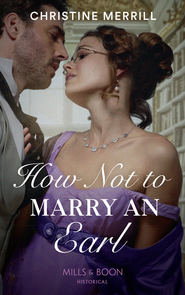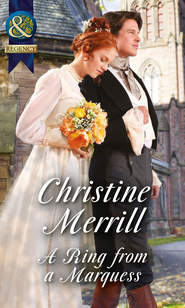По всем вопросам обращайтесь на: info@litportal.ru
(©) 2003-2024.
✖
Lady Folbroke's Delicious Deception
Настройки чтения
Размер шрифта
Высота строк
Поля
‘Of course not, Hendricks. Had he expected me, my darling Adrian would have been shooting in Scotland. Or on the Continent. Anywhere but sharing London with me.’ She tried a light laugh to show how unimportant it was to her, and failed dismally. She ignored the strange, sharp feeling in her stomach and the ache in her heart that came from knowing she was not really wanted.
The secretary had the courtesy to look shamed by it, but made no effort to deny what she had said.
‘I suppose it is too much to hope that he is here at the moment.’
‘No, my lady. He is out.’
‘That is the same story you give to his cousin Rupert, who has been tormenting me endlessly on the subject of Adrian’s whereabouts. I have had enough of it, Hendricks.’ She stopped to breathe, for while her tone had sufficient volume, she did not want it creeping into shrillness. Then she continued. ‘My husband must accept that, if he cannot deal with his heir, he will have to deal with me. It is unfair of him to avoid us both. And while I am quite willing to shoulder the responsibility of land, tenants, crops and several hundred-odd sheep while Adrian gallivants about the city, the added burden of Rupert is simply too much, Hendricks. It is the last straw to this camel.’
‘I see, Lady Folbroke.’ Hendricks had replaced his hunted look with an expression of neutral courtesy, as though he hoped that his silence would still her questions.
‘My husband is still in the city?’ She gave the man a critical look.
He squirmed and nodded.
She nodded in reply. ‘And how long might it be until he returns here?’
The secretary gave a helpless shrug.
‘Honesty, Hendricks. You know more than you are saying, I am sure. All I require of you is a simple answer. I intend to wait as long as is needed, in either case. But it would be nice to know if I should request a light meal, or send for my trunks and prepare for an extended stay.’
‘I do not know, Lady Folbroke.’ There was a kind of hopelessness in the statement that made her almost believe the man.
‘Surely he must tell you his plans when he goes out.’
‘When he bothers to make them,’ the secretary said, revealing a bitterness that smacked of honesty.
‘If he sets an agenda, he rarely keeps to it. Sometimes he is gone for hours. And other times days.’
‘Then he must be letting rooms elsewhere.’
‘This may be true. But I do not know where, for I have never visited them. And when he returns?’ Hendricks shook his head, clearly worried.
‘I suppose he is foxed.’ She gave a disgusted sigh. It was no less than she feared about him, but the confirmation did nothing to improve her mood.
‘If that were all. He is …’ Hendricks struggled to find a phrase that would not give up a confidence. ‘Not well. Unhealthy, my lady. I doubt he eats. Or sleeps. When he can bring himself to come home after one of these excursions, he collapses for days at a time. I fear he will do himself an injury through self-neglect.’
‘His father was around the same age when he lost his life, was he not?’
‘Yes, my lady. A riding accident.’
It was gently put, as was everything Hendricks said. The man was a master of understatement. But she remembered the circumstances quite well, for the severity of the last earl’s injuries had been the talk of the neighbourhood. Adrian’s father had been the worse for drink, and riding hell for leather through the woods, taking jumps that other men would not have risked while sane and sober. The fall had killed both man and horse in a way that was neither quick nor painless.
Her brother had said nothing of his friend’s reaction when the accident had occurred. But she could remember clearly the solemn darkness of the young man on the neighbouring estate, and the way it had both frightened and intrigued her. ‘Perhaps it preys upon his mind. And all the more reason that I should be here to put a stop to it.’
The secretary looked both doubtful and hopeful, as though he could not decide where his loyalty might lie.
‘Summon the coachman who took him when he departed, so that we might learn his destination. If we can find his normal haunts, then I will search them until I find him.’
‘You cannot,’ Hendricks leaned forwards, and she knew the situation must be serious for the taciturn man was clearly alarmed.
‘I mean to do it, all the same.’
The man stared into her eyes, as though to gauge the strength of her resolve. Then he sighed. ‘I will accompany you.’
‘That is hardly necessary.’
Hendricks squared his shoulders, doing his best to look formidable. ‘I am sorry, Lady Folbroke, but I must insist. If you mean to continue on this unadvisable course of action, than I cannot leave you to do it alone.’
‘And who gives you the right to question me?’
‘Lord Folbroke himself. He has been quite clear to me in his instructions, with regards to you. I am to assist you in all things, trust your judgement and obey you as I would him. But first and foremost, he trusts me to keep you from harm.’
The sentiment brought her up short. After a year of silence on his part, it had never occurred to her that her husband thought of her at all. And certainly not for a sufficiently protracted time as to concern himself with her safety. ‘He worries about me?’
‘Of course, my lady. He asks after you each time I return from Derbyshire. Normally, I assure him there is no reason to be concerned. But in this case?’ He shook his head.
Emily dismissed the momentary feeling of warmth at the picture of Adrian asking about her. ‘If my welfare is his foremost desire, perhaps he could have seen fit to share it with me. Or he could make an effort to stay out of low haunts himself. Then it would not be necessary for me to seek him in a place he did not want me to go.’
Hendricks was frowning at the twisted logic of her statement, trying to find a rebuttal, so she allowed him no more time. She turned to the butler. ‘Abbott, have the carriage brought around. Mr Hendricks and I will be going out. We will be returning with Lord Folbroke.’
She glared at Hendricks. ‘Whether he likes it or not.’
‘You are sure this is the place?’ The building before her gave every indication of being just what it was: a villainous hole that was well below the genteel debauchery she’d expected.
‘Yes, my lady,’ Hendricks said, with a grim smile. ‘Of late, the servants bring him here. He finds his own way home.’
She sighed. There was a sign swinging above the battered door that appeared to be a woman of limited virtue, and even more limited clothing. ‘What is it called, then?’
‘The Whore’s Left …’ Hendricks coughed as though he could not bring himself to finish the name.
‘Is it a brothel?’ She peered out the window at the grimy glass panes in front of her, trying not to show the curiosity she felt.
‘No, my lady. A public house.’
‘I see.’ It was nothing like the rather conservative inn in their village. But things were very different in London, she was sure. ‘Very well, then. Wait in the carriage.’
‘I most certainly will not.’ It was a moment before the secretary realised how completely he’d overstepped his bounds in his effort to protect her. Then he said more softly, ‘I have been through doors like that one, and seen the clientele inside. It is a dangerous place for Lord Folbroke and even more so for a woman alone.’
‘I do not mean to be there long enough to experience risk. If he is there, he will think the same as you, and though he might choose the place for his own entertainment, he will be forced to escort me out of it. But I do not mean to leave without him.’ She set her chin in the way she did, to let the Derbyshire servants know that she was brooking no more nonsense, and saw the secretary weaken before her.
‘If you find him, he might not be willing to go.’ Again there was a delicate pause as he searched for a way around her orders. ‘You might need my help.’
It was perfectly true. She had no reason to believe that her husband would listen to her entreaties, if he would not answer her correspondence. ‘Would you remove him by force, if needed?’
Hendricks paused again. To take her side when in the presence of her husband would seem close to mutiny. He had been Adrian’s aide-de-camp in the army, and had the fierce loyalty of a soldier to a superior officer to match his dedication to a friend and employer. But then he said, as though the confession was a thing he did not want to share, ‘If the instruction came from you, and it was meant for his own good, I would do it. There are reasons for his aberrant behaviour, which you will understand soon enough. But if he is no longer able to act in his own best interests, then someone must do it for him.’
Emily touched Hendricks’s shoulder to reassure him. ‘Do not fear for your position. I promise you will come to no harm for doing what is right. But we must be agreed on this before we begin. I will ask him to come. And if he does not, you must help me remove him.’











